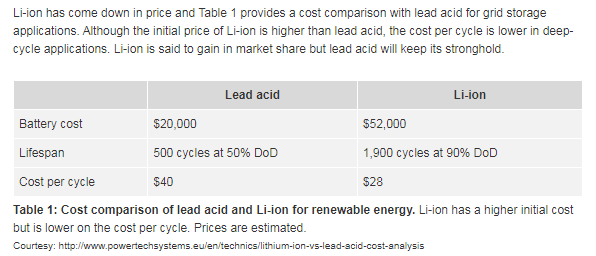A subject borrowed from another forum that is never entirely put to bed…
In short, lithiums is a no brainer (to me}. There is no way on earth that lead acid can ever again compete with Lithiums.
Lead acids genarally come with a 1 year garuantee, lithiums with 7 to 10 years.
Most lead acids can only be discharged to 80 percent, lithiums to 20 percent.
Most of the recreational lead acid batteries can be damaged beyond repair with one single over discharge… And with a stage 4 loadshedding an over discharge is almost unavoidable.
Lead acid has no internal protection and relies on all kinds of external devices to monitor and Control loads to try and protect them. Lithiums has build in protection
Lead acid need much bigger installation area than lithiums for the same storage capacity.
It need to be installed in a well ventilated area because of the gasses, lithiums can be installed in a cupboard.
I believe the effect of temperature on lithiums is less than on lead acid, but can not prove this.
Aa while back, I compared a certain recreational battery against lithiums for a client, I compared expected life, usable power and lastly the price.
The client needed 4 sets of lead acids to give the same usable kwh storage as one set of lithiums. The cost of the leads were just over 40k vs the lithiums just over R60k. The expected life of the lithiums were 6000 cycles and the expected life of the lead acids were just over 900 on the data sheet {which I seriously doubt). So now theoretically I would need six sets of lead acids to get the life of one set of lithiums.
Personally, I believe that the days of leads acids in the RE field is over… I refuse to even sell them to clients as I have seen pretty reputable brands fail within a year with frequent load shedding.
Also lithium charges really quickly and doesn’t stress to much over heavy current charging, it just soaks up the charge, far quicker than lead acid.
I agree with @JacoDeJongh and @Whatyamacallit … I think the debate has moved on already (for small-scale RE storage anyway!)
From what I’ve read on the topic, the location of Lithium on the period chart is not for nothing. When talking about the battery of the future, it is likely to be some kind of lithium battery. A lot of research is of course going into making it even better, improving cycle life, charge rate (for electric cars of course), and most of all (the big outstanding issue), easily recycling it, or finding second-life uses.
There is however room for a different chemistry: Where space is not a consideration, and where it is cheaper or where it is easier to recycle, other chemistries may play a role in future. That’s where things like the salt water battery come in.
Lead Acid does have that going for it: Over 90% of the battery can be easily recycled. If we could just increase the cycle life, there might yet be a future for it.
This is the current state of play provided by Battery University (Cadex)

I’m hoping Sodium Ion batteries take off soon.
https://spectrum.ieee.org/energywise/energy/batteries-storage/sodium-ion-batteries-poised-to-pick-off-large-scale-lithium-applications
And this brings me to another important point I forgot about. Charge efficiency. Lithiums charge efficiency is very close to one where with lead acid you would need to recharge 1.25 - 1.4 kwh for every kwh used. {depending on conditions and brand}
Yes, I agree. The round-trip efficiency of Lithium batteries is >90% while for lead-acid it’s about 70%.
So you waste a lot more energy using lead-acid batteries.
My opinion:
If you look at cost over the lifespan then litiums are an easy choice. They are also more versitile in their use cases.
I have to wonder if the average person looks at recycling options when they buy a battery. You only look at that when you replace it and with lithiums that is most likely only 10 -15 years later (except for TTT of cause  )
)
It’s true that the Lithium’s are way better and agree that the discussion has moved on,
But most newbies will find themselves having to make that decision (huge capital outlay for a UPS system in case Eksdom doesn’t deliver what a person already paid for). In most UPS scenarios, the goal is to spend as little capital as possible. Yes if you know long term lithium blah blah blah. A newbie just wants a solution for loadshedding (the decision is mostly short term based)
Once in this though, the dynamics change, interest grows and one starts to ask key questions:
Why not reduce reliance on Eksdom overall?
What I would need? Etc.
This is where capital input changes altogether.
You can pay for a R60k Freedom battery knowing that it’s a long term game……
Not short term UPS solution for that odd and random Load-shedding day in a property that you might sell once kids move out!
Lets say they want a 48v system. You can buy a lithium battery 48v 100Ah lets say 24k, or you can buy 4x 12v 100Ah deep cycles at 4k a pop so you save 8k, BUT they can only go 50%discharge so now for the equivalent in lead acid you actually need 8 batteries so now you 8k over the price of lithium with 8 inferior batteries. Comparing lithium with lead acids is like comparing mercedes with a horse cart.
There is a fair bit of support on the 4x4 Community forum for lead acid batteries.
Have a look for yourself. I don’t think this subject is history just yet.
Anybody know the cost difference between the two?
Which two, specifically? LA AGM vs Gel or Lithium vs LA?
As per the article: AGM vs Gel